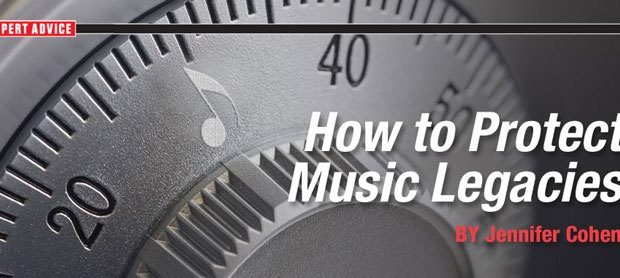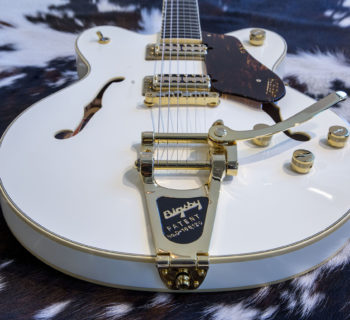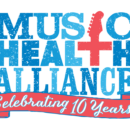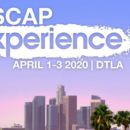Many musicians are so focused on making great music during their lifetime that they do not have time to think about how their musical compositions and recordings will be preserved for future generations. The issue becomes even more challenging for those who inherit a music collection, often with little or no guidance on how to begin cataloging and making sense of the musical treasures that have been left behind.
Whether you have inherited a collection or a working music-maker, here are some steps you should take to ensure that important collections are preserved, protected and available for both personal and public enjoyment, now and in the future.
1. Know what you own. Everything starts with knowing the titles of works you think you own, whether they are written lyric and music compositions or audio/video recordings. Make sure you have an accurate and up-to-date record of what you have rights to and interests in, including all versions that might qualify for their own individual copyrights, both for the composition and the sound recording. If necessary, find a Virgo or an organizing wizard to help you get this done
2. Keep track of your tracks. With labels today less involved with back catalog and publishers often focused on only a fraction of their titles, it is up to heirs and artists to keep track of the key information for each musical work, including: the date of creation or copyright; your percentage of ownership; the names of any co-writers and/or band members on each specific work; the publishers, record companies and anyone else who owns rights to each work; and expiration dates and terms of deals, licenses, interests or copyrights, including auto renewal dates or reversion dates (if rights return to you).
3. Keep and maintain good physical copies of each of the works in your collection. No matter what medium a work was created in—on a smartphone, on tape, on vinyl, live, even on a paper napkin—keep the original in its original format (if you can) and make high-quality digital copies for storage, sharing and demos. This is important for history and for business, especially if you want to commercialize any of these works. Do not keep playing those tapes or vinyls without having safety copies in digital formats.
4. Create a catalog for compositions and/or recordings. This is important in order for you to stay on top of royalties and other proceeds that are or will be due from existing and future (perhaps entirely new) revenue sources. For compositions, check with the Performing Rights Societies (ASCAP, BMI and/or SESAC). For recordings, locate the record company or distributor that initially released the recording(s). Because of consolidations and re-assignments of rights, you need to know which record company or distributor now holds the catalog for your original creations and for any derivative works in order to know about your royalty income.
5. Make a plan about using some (or all) of your legacy catalogue over time. To make the most of a legacy collection requires good judgment about whether you have titles that can be re-released in new formats, for new uses, or through new distribution streams. Re-recording in updated styles and genres is also an option. For the vigilant and the diligent, there are so many new ways to increase the value and make the most of your legacy collection. Central to this plan is determining whether you can promote and monetize the catalogue yourself, or need assistance through representation or an independent consultant.
6. Understand copyright law enough to know how it affects your titles. Nothing affects the financial success and creative integrity of a music legacy like the protection of copyrights. Time-sensitive provisions of copyright law may give your catalog a whole new value, depending on when your works were licensed (granted) for publication or recording. The all-important Copyright Act of 1976, which took effect on Jan. 1, 1978, has a powerful effect today on deals going forward for all music creatives, living or not.
We can’t give a formal review of this law here, but the key point for folks managing legacies is this: For music works copyrighted in the U.S. that were not created as “works for hire,” this law provides that copyright licenses (a.k.a. “grants”) may be re-claimed after 35 years. So, if the copyrights to your works were licensed after Jan. 1, 1978, they have recently begun to “ripen”—that is, to become eligible for rights holders to reclaim them. Copyright grants made in 1978 “ripened” in 2013, licenses granted in for 1979 ripened in 2014, and so on. Copyrights granted for license before then can also be reclaimed, though the “ripening” details are more complex.
And here is the key kicker: You have only a five-year window from the “ripening” date in which to reclaim copyright licenses and make them more advantageous to you.
If you are responsible for the musical legacy of an artist who licensed copyrights to a music publisher or record company at the beginning of a career when leverage or value were lowest, you now have a means to reclaim that copyright license if the time is “ripe,” regain a better economic interest and re-grant copyright on better business terms, including for specific, newly developed uses. Since the needed steps are specific, be sure to get help if you need it about how to notify, renegotiate and reclaim your copyright licenses. And tick-tock, watch the clock to ensure sure you do this timely, if this applies to your situation.
7. Make sure to cover all platforms and uses in your licensing deals, whether you are re-negotiating based on your right to do so under the copyright law or creating new deals for existing works that may not have been licensed yet. This may require some customized deals, as different platforms offer different terms (e.g., iTunes, Spotify and Pandora are all different; physical is different from digital; and video is different from sound). You also need to anticipate completely new methods of distribution and delivery that we have not even conceived of—so make sure your deals have a “future uses” clause or language in each of the deals you make.
Music lives forever, and with good record-keeping, good info and good deals, you will ensure that you can and will get the best benefit from the long life of your own creations or the music legacy in your care now.
JENNIFER COHEN oversees POBA | Where the Arts Live, a not-for-profit initiative of the James Kirk Bernard Foundation that provides support, assistance and an online platform for preserving, sharing, and promoting the works of deceased artists, both known and unknown. A senior entertainment and music industry veteran with more than 30 years experience, she is also Managing Partner of Songmasters, the award winning brand marketing, communications and music distribution company. For more information, visit poba.org.










